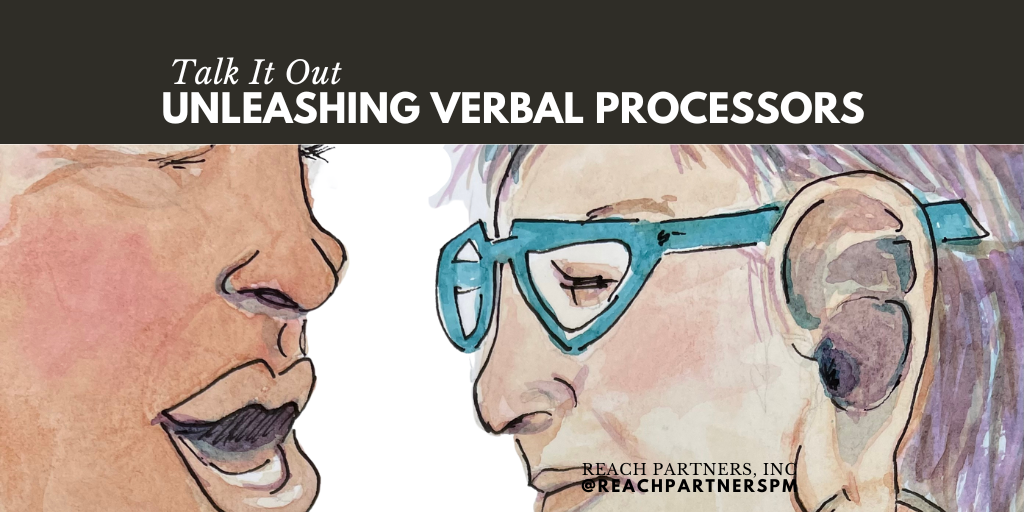|
We all have different ways of evaluating information. Some of us are quiet thinkers; others like to write things down before sharing our thoughts. Several of our clients are verbal processors. Some of these leaders describe themselves as such – they know who they are. Others don’t necessarily see identify themselves as verbal processors, usually because they’re quieter by nature. Verbal processors aren’t always the loudest people in the room, but they do need to speak aloud to make sense of the world, to process perspectives, to refine ideas, and to make the breakthroughs. When Reach Partners is asked to work these types of leaders, we know they are being called to action and need a receptive ear. We do everything in our power to reflect clarity, provide context, and, of course, maintain confidentiality. And we do it all through active listening.
There is nothing wrong with verbal processors. We find people with this quality to be highly intelligent. They are effective leaders and, of course, wonderful communicators. We hope every person who needs to talk things out can do so. In the process they’ll make sense of the world and have their breakthroughs. If you are working with a verbal processor, here are some ways of being a good partner: Maintain Confidentiality. Many times, people mistake what they hear in a verbal processing session as being a thing, or an action promised, or something to be shared with others outside of the conversation. As a consultant, what is said during any client session – whether they are verbal processors or otherwise – is for the receiver only. Period. Focus on Purpose. Listen for the leader to provide the purpose, a charter, context or do some research to ground yourself in the purpose of the project. Verbal processors may stray from purpose, a natural part of the process, to play with ideas or to expand concepts. Listen without Judgment. Some of the conversation will not make it to subsequent conversations nor will it be addressed during the next steps of the project. That’s ok, that’s part of the verbal processor’s process. Listen with Intent to Act. Listening to verbal processors is not about providing emotional support – although there may be emotions tied to the project or how the work is done. Rather serve as a sounding board. Does the logic follow? Is there something that should be expanded upon? What doesn’t make sense? Listen with the intent to identify steps, stakeholders, or critical items that need action. This is collaboration with the fresh ears of an outsider. Take Note. Notes are helpful for non-verbal processors to evaluate ideas. They also allow the verbal processors to have a product or deliverable at the end of their session. Extend Thinking. As an active listener your key skills are to reflect clarity, ask deepening questions, riff, and actively interpret what the verbal processors shares (and doesn’t share). This allows the verbal processor to navigate from ideas and visions to reality. If you’re a verbal processor, find a partner who can understand your goals and listen to extend your thinking. If you’re on the listening side, we hope you can expand on these take-aways. –Rachel
0 Comments
Your comment will be posted after it is approved.
Leave a Reply. |
Reach PartnersYour partners in leadership. Categories
All
Archives
July 2024
|
|
|
Reach Partners, Inc
3330 Fiechtner Dr. Suite 100 Fargo, ND 58103-2321 701-271-8170 Copyright (C) 2024 Reach Partners Inc.
|

